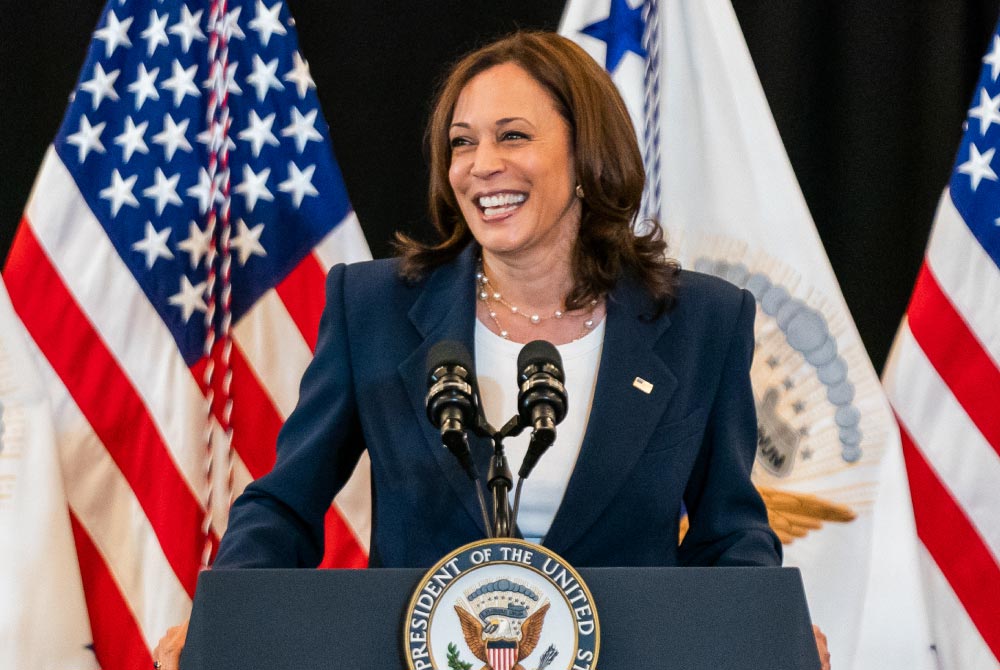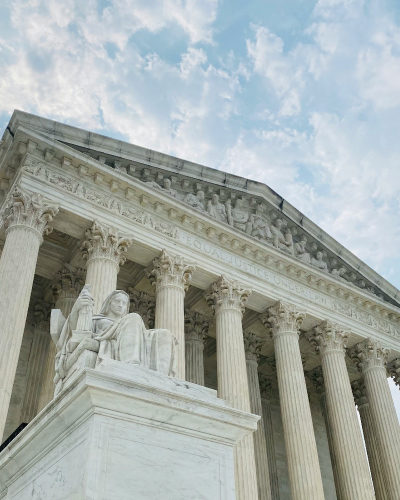
LCV Organizer Stories: From Climate Denial to Climate Activism
Nov 4, 2024
Choose to fight back: make a gift to LCV to show your commitment to our climate and democracy Give Now
 Credit: Cameron Smith, White House Flickr
Credit: Cameron Smith, White House Flickr
Each month, LCV shares five stories about the impact of our work. This month, we’re excited to highlight the LCV Action Fund endorsement of VP Harris, Vermont’s recent 100% clean energy commitment, federal climate resilience investments, rural clean energy and environmental justice progress, and Chesapeake Bay protections.
Four leading environmental, clean energy, and climate organizations — including LCV Action Fund, NRDC Action Fund, Sierra Club, and Clean Energy for American Action — recently endorsed Vice President Kamala Harris for president.
The Biden-Harris administration has done far more to address the climate crisis and environmental injustice than any administration in our nation’s history. Harris provides a stark contrast to Donald Trump, who proposed that Big Oil spend $1 billion to get him elected because he’d gut environmental protections, has mocked climate change as a “hoax,” pulled the U.S. out of the Paris agreement, and rolled back or eliminated more than 100 regulations designed to protect our land, air, and water.
Harris’ commitment to climate action spans decades, including her time as California’s district attorney and attorney general, U.S. senator, and vice president:
Watch as Harris outlines her vision for climate action and ambition for building a cleaner, healthier, and more prosperous world:
As Vice President, Harris has been a fierce ally in the fight against the climate crisis. To date, the Biden-Harris administration has taken more than 300 actions to protect clean air and water, tackle environmental injustice, and protect our public lands and waters — and enacted the historic Inflation Reduction Act.
Electing Vice President Harris as president this November will help ensure that the Biden-Harris climate agenda remains intact and continues to make the much-needed progress to shape the healthy, safe, and prosperous future we all deserve.
The Biden-Harris administration recently announced 148 new infrastructure and climate resilience grants across the country. This $1.8 billion investment will make transportation infrastructure more resilient to extreme weather, reduce consumer costs by improving supply chains, boost the economy, improve health, and create good-paying union jobs in communities in all 50 states, four territories, and Washington D.C.
The funds stem from the Infrastructure Investment and Jobs Act, which — along with the Inflation Reduction Act — is part of the larger federal clean energy plan enacted in the last three years. Since these laws were passed, LCV and our state affiliates have organized to ensure the equitable distribution and implementation of these investments in communities across the country.
The latest 148 grants will benefit communities in multiple ways, including:
The Alaska Highway is a lifeline for Alaskans. Federal grant money will be used to address severe road conditions associated with thawing permafrost to help ensure that the only all-season overland corridor between Alaska and the lower 48 remains traversable.
Access to affordable, safe, and clean transportation is often not available to all communities due to inequities in transportation infrastructure. Federal grant dollars will be used to create shared-use paths in Detroit to address historic transportation inequities, improve safety, reduce air pollution, and improve quality of life through more affordable transportation options.
To encourage walking, this project will reconstruct streets in Browning, Montana to address roadway safety and increase pedestrian use — decreasing dependency on motor vehicles and reducing emissions.
This project will improve 33 intersections with a focus on non-motorized travelers — focusing on safety, environmental sustainability, quality of life, integration of ADA requirements, community connectivity, and economic competitiveness.
People living in communities near active ports are often exposed to health-damaging emissions. This project will redesign and reconstruct a portion of Puerto Rico’s Puerto Nuevo Docks, improving safety and quality of life for terminal workers while also benefiting surrounding communities thanks to increased port efficiencies and fewer idling vessels.
Addressing the climate crisis requires building climate resilience while also lowering emissions, and the projects funded by federal grants will achieve both. Find out what’s happening in your state.
Rural residents across the country will soon enjoy lower electric bills and expanded access to clean energy due to more than $375 million in recently announced federal funding for hundreds of rural clean energy projects.
More than $275 million will flow to rural electric cooperative projects in Alaska, Arizona, Kentucky, and Nebraska, to improve and increase battery energy storage systems and build hydroelectric and solar plants.
Grants like these are part of the larger federal clean energy plan, which is creating a clean energy future through:
Lower energy costs
Expanded access to clean electricity
Strengthened U.S. energy independence
Good-paying, clean energy jobs
As part of this grant process, the U.S. Department of Agriculture will be partnering with hundreds of family farms, small businesses, rural electric cooperatives, and local clean energy developers to grow the economy, save rural residents money, and address the impacts of climate change.
Funding for these rural clean energy projects stems from the 2022 Inflation Reduction Act and the Biden-Harris administration’s Justice40 Initiative, which aims to ensure that 40% of federal climate and clean energy investments flow to communities that have been historically excluded and overburdened by pollution, including Black, Indigenous, Latine, low-wealth, and underserved rural communities. The Justice40 Initiative was introduced in 2021, when President Biden signed the related executive order during his first week in office, and is the largest-ever U.S. national commitment to environmental justice.
This initiative is the result of decades of leadership and advocacy by environmental justice communities and leaders. LCV was proud to work in partnership with many leaders from the environmental justice movement to ensure that addressing environmental injustice is a top priority for the Biden-Harris administration. LCV is an inaugural and current member of the historic partnership that co-authored the Equitable & Just National Climate Platform, which helped finally deeply intertwine climate and environmental justice in national climate policy and influenced the creation of the Biden-Harris administration’s Justice40 Initiative.
The Chesapeake Bay is the nation’s longest estuary and one of the mid-Atlantic region’s most important natural resources. Waterways from Delaware, Maryland, New York, Pennsylvania, Virginia, Washington D.C., and West Virginia all feed into the bay, which supports hundreds of species of fish, shellfish, amphibians, reptiles, birds, and mammals.
The bay is also a significant economic driver in the region, bolstering the region’s economy through a mix of tourism, recreation, and industry, including:
The bay’s economic benefits and biologically diverse ecosystem face challenges and threats from overfishing, degraded water quality, and habitat destruction — with recent years seeing sharp declines in critical species such as the native oyster.
Efforts to protect and restore the bay are underway, and the Biden-Harris administration recently announced $22.4 million across 13 grants to do just that. These funds will leverage $35.3 million in matching contributions, creating a $57.7 million total conservation investment.
Grant recipients in the mid-Atlantic region will use funds to address a variety of threats to the bay, including by:
LCV and our state affiliates work to advance conservation initiatives like this through advocacy, grassroots organizing, and community engagement.
The effects of climate change were crystal clear in Vermont last year. The state saw myriad climate disasters, including devastating flooding that necessitated more than 200 urban and swift water rescues, washed out roads and bridges, and caused land and mudslides leading to fatalities and significant property damage across the state.
All of this added to the urgency already felt by Vermont Conservation Voters (VCV), LCV’s affiliate in the Green Mountain State. During the recently completed legislative session, VCV spearheaded two momentous policy wins using a combination of strategies including research, coalition building, constituent mobilization, and meeting with lawmakers — all outlined below.
The efforts by VCV built overwhelming tri-partisan support in the legislature — enough to motivate reluctant Governor Phil Scott to let the 100% Renewable Energy Standard become law without his signature and to secure a legislative veto override of the Climate Superfund, making Vermont the first state in the nation to hold Big Oil financially responsible for its share of climate damages.
The Vermont legislature updated the state’s Renewable Energy Standard (RES), mandating 100% clean electricity by 2035. Under the updated RES, Vermont’s two largest utilities — together serving about 70% of the state — must adhere to a faster timeline and achieve 100% clean electricity by 2030, the fastest timeline in the nation.
Vermonters will no longer be left to shoulder the full cost of climate-related disasters, due to a new requirement that holds the largest fossil fuel companies accountable for the costs of damages resulting from climate pollution from their products. Vermont is the first state to hold big polluters financially accountable in this way, directing funds into a new Vermont Climate Superfund to invest in disaster response and climate change adaptation projects.
Importantly, the policy does not target businesses that distribute fossil fuels, like fuel dealers or gas stations. Instead, it goes after the biggest global corporations that extract and refine fossil fuels — including companies that have known for decades that their products are disrupting the climate.
VCV partnered with Vermont Natural Resources Council and collaborated with allies, key stakeholders, and policymakers to secure these wins using a broad and effective set of approaches:
State-level victories like these are happening nationwide, thanks to the work of LCV’s 30+ state affiliates. See what’s happening across the country.
The Best Thing You Can Do Right Now
Extremist MAGA Supreme Court justices have given the green light to lawbreaking presidents, limited the federal government's ability to regulate climate pollution, stripped Clean Water Act protections, rolled back voting rights, and overturned Roe v. Wade. To protect people, our planet, and our democracy, Congress must rein in this unbalanced, unaccountable, and unethical Supreme Court majority.
Tell Congress: Rein in MAGA Justices